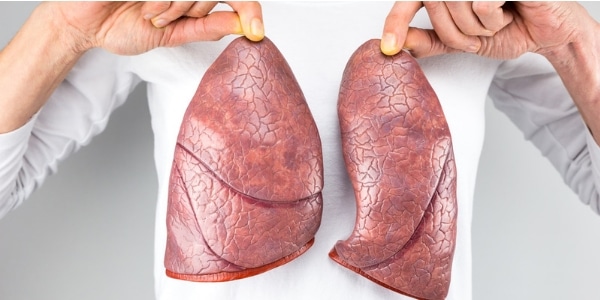Age can have a negative effect on lung capacity. Like many bodily systems and functions, the lungs reach peak maturity at a relatively early age and then gradually decline.
Physicians and scientific researchers opine that human lungs attain peak performance between the ages of 20 and 25. After roughly age 25, lung function diminishes but at a slight and gradual pace.
The Biological Processes Behind Decreased Lung Function
There are several systemic occurrences medical professionals believe are the cause for decreasing lung capability, as people grow older. In many instances, these changes are subtle and can be attributed to the natural aging process and include the following:
- Lung-Tissue Alterations – As an individual ages, tissue within the lungs begin to lose elasticity and flexibility. This may impact the organs’ ability to properly expand. Furthermore, this occurrence can restrict airways, which can result in greater difficulty breathing.
- Diaphragm Weakness – As individuals get older, their muscles lose a certain degree of strength. One muscle often impacted is the diaphragm, which is responsible for precipitating the in and out contractions necessary to breathe.
- Decline in Rib Cage Bone Mass – Age sometimes brings with it a decline in bone mass. When the rib cages are adversely impacted, the lungs might have less room to expand.
- Increased Risk of Lung Ailments – Of course, with age comes an increased risk of developing a host of lung-related ailments. Some of the more serious issues include emphysema and lung cancer. This is particularly true if the individual in question has a family history of severe lung illness or engages in any potentially detrimental lifestyle habits like cigarette smoking or is obese.
 When to Be Concerned?
When to Be Concerned?
Doctors suggest that lung function will gradually decrease, ever so slightly, once a person reaches the age of 35. However, they also caution individuals to seek prompt medical attention if they experience any sudden or severe breathing difficulties.
Maintaining Lung Health
Fortunately, people may be able to stem the tide of lung aging and keep these vital organs relatively healthy by adhering to certain practices:
- Staying Hydrated – Proper fluid intake ensures that the lungs’ lining remains moist and lubricated. This action enables the lungs to function more efficiently and better filter out potentially detrimental particles like allergens.
- Exercising – Physical activity stimulates lung function and helps the organs better process oxygen. Medical professionals suggest that lung function may be maintained by engaging in at least one-half hour of fairly moderate exercise per day.
- Laughing – Believe it or not, laughing can prove vital for optimal lung function. Doctors and other breathing experts suggest that having a good chuckle from time to time strengthens the diaphragm and other abdominal muscles pertinent to the breathing process. These same healthcare professionals claim that laughing also helps the lungs clear away stale, possibly contaminated air with a fresh supply.
- Augmenting Diet With Substances Known as Flavonoids – These chemicals contain antioxidants and are most often found in produce products such as fruits and vegetables. Antioxidants are powerful substances that reduce systemic inflammation. Several scientific research studies have found that flavonoids can play a significant role in protecting lung tissues from aging and becoming susceptible to various diseases.
- Performing Various Breathing Techniques – The way in which individuals breathe could significantly influence overall lung function. One specific technique is known as diaphragmatic breathing: exhaling using one’s stomach more than the chest. Another exercise is known as pursed-lip breathing. This action is performed by inhaling through the nostrils and exhaling through the lips.
- Avoiding Bad Habits – There are few greater threats to lung function than smoking. Individuals who smoke are strongly encouraged to quit. Many individuals who have ceased smoking eventually regained a significant percentage if not all of the lung function the detrimental vice once cost them.
- Monitoring One’s Health – Everyone over age 35, especially if they have a family history of any significant lung disease, are advised to have their lungs checked as part of routine medical checkups.

 When to Be Concerned?
When to Be Concerned?



